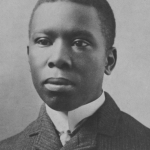Dey is times in life when Nature
Seems to slip a cog an' go,
Jes' a-rattlin' down creation,
Lak an ocean's overflow;
When de worl' jes' stahts a-spinnin'
Lak a picaninny's top,
An' yo' cup o' joy is brimmin'
'Twell it seems about to slop,
An' you feel jes' lak a racah,
Dat is trainin' fu' to trot—
When yo' mammy says de blessin'
An' de co'n pone's hot.
When you set down at de table,
Kin' o' weary lak an' sad,
An' you 'se jes' a little tiahed
An' purhaps a little mad;
How yo' gloom tu'ns into gladness,
How yo' joy drives out de doubt
When de oven do' is opened,
An' de smell comes po'in' out;
Why, de 'lectric light o' Heaven
Seems to settle on de spot,
When yo' mammy says de blessin'
An' de co'n pone's hot.
When de cabbage pot is steamin'
An' de bacon good an' fat,
When de chittlins is a-sputter'n'
So's to show you whah dey's at;
Tek away yo' sody biscuit,
Tek away yo' cake an' pie,
Fu' de glory time is comin',
An' it's 'proachin' mighty nigh,
An' you want to jump an' hollah,
Dough you know you'd bettah not,
When yo' mammy says de blessin'
An' de co'n pone's hot.
I have hyeahd a' lots o' sermons,
An' I've hyeahd o' lots o' prayers,
An I've listened to some singin'
Dat has tuck me up de stairs
Of de Glory-Lan' an' set me
Jes' below de Mastah's th'one,
An' have lef' my hea't a-singin'
In a happy aftah tone;
But dem wu'ds so sweetly murmured
Seem to tech de softes' spot,
When my mammy says de blessin',
An' de co'n pone's hot.




















Comment form: